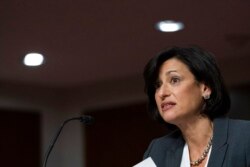The U.S. Centers for Disease Control and Prevention expanded COVID-19 booster shot eligibility for some adolescents to combat the highly transmissible omicron variant of the coronavirus. The move comes as the agency faces criticism over confusing messaging on how to cope with infections.
In a statement late Wednesday, CDC Director Rochelle Walensky urged youngsters age 12 and older to get a COVID-19 booster as soon as they're eligible. Boosters were previously encouraged for people in the United States who were 16 and older.
The Pfizer-BioNTech vaccine is the sole option for children in the U.S. The CDC estimates that slightly more than half of 12- to 17-year-olds, 13.5 million people, have received two Pfizer shots. Boosters were first made available to 16- and 17-year-olds in December.
Wednesday's decision makes about 5 million younger adolescents who received their last shot in 2021 immediately eligible for boosters.
"This booster dose will provide optimized protection against COVID-19 and the omicron variant," Walensky said in the statement. "I encourage all parents to keep their children up to date with CDC's COVID-19 vaccine recommendations."
Although children tend to not become as seriously ill from COVID-19 as adults, the omicron variant is fueling hospitalizations among children, most of whom are unvaccinated.
Walensky's latest announcement came amid criticism of CDC messaging about how to respond to COVID-19 infections.
The American Medical Association, which represents physicians and medical students, issued a statement Wednesday criticizing the agency's new quarantine and isolation recommendations. Last week, the CDC issued updated guidelines that shortened isolation periods from 10 days to five if they no longer have symptoms. The CDC defines isolation as separating "sick people with a contagious disease from people who are not sick."
The CDC also maintained that infected people are not required to be tested for COVID-19 before emerging from five days of quarantine.
"A negative test should be required for ending isolation after one tests positive for COVID-19. Reemerging without knowing one's status unnecessarily risks further transmission of the virus," said AMA President Gerald Harmon.
Some information for this report was provided by The Associated Press.





